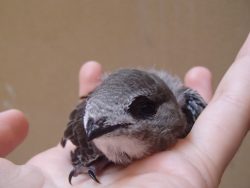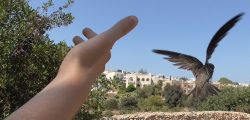Raising a baby bird is not an easy task; they needs lots of attention and patience. Even for a tiny bird like the swift a lot of work goes into turning a fluffy nestling into a healthy adult!
Unlike other baby birds such as sparrows, young swifts won’t be cared for by their parents when they fall from the nest, or even abandoned. This is why BirdLife Malta steps in and we try our best to raise these birds until they are strong enough to survive independently!
 Being a swift “mum” brings with it many challenges. It means ensuring they receive enough water and have a steady stock of insects like crickets, mealworms and waxworm caterpillars on hand, ready to feed a hungry chick at a moment’s notice – which can be up to every two hours! Swifts consume huge amounts of insects in flight and their parents would usually provide them with a constant supply until they are ready to leave the nest, after about three weeks. Being a swift “mum” also means doing the less glamourous job of picking up bird poo just like a swift parent would! Swift parents do this to keep away any smell that could attract predators to the nest that would eat the swift chicks. Making sure that the fledglings practice their wings after every meal and testing their ability to grab on to vertical surfaces to help them with nest building when they reach maturity after three or four years is also an important part of the process! Equipped with a pair of scales and a trusty notebook, all of this is carefully and regularly monitored to ensure these tiny chicks are healthy and developing as expected.
Being a swift “mum” brings with it many challenges. It means ensuring they receive enough water and have a steady stock of insects like crickets, mealworms and waxworm caterpillars on hand, ready to feed a hungry chick at a moment’s notice – which can be up to every two hours! Swifts consume huge amounts of insects in flight and their parents would usually provide them with a constant supply until they are ready to leave the nest, after about three weeks. Being a swift “mum” also means doing the less glamourous job of picking up bird poo just like a swift parent would! Swift parents do this to keep away any smell that could attract predators to the nest that would eat the swift chicks. Making sure that the fledglings practice their wings after every meal and testing their ability to grab on to vertical surfaces to help them with nest building when they reach maturity after three or four years is also an important part of the process! Equipped with a pair of scales and a trusty notebook, all of this is carefully and regularly monitored to ensure these tiny chicks are healthy and developing as expected.
During the time spent in our care, we have to constantly work to ensure young swifts do not associate people with food or safety or ‘imprint’ on their carer by only spending necessary time in contact with the bird – not a second longer! If they become too domesticated it will hinder their ability to survive on their own. These birds are wild; the only reason to raise them is if they are going to be released back into their natural habitat. Of course, it is difficult when you care so deeply about the bird and its life depends on you. However, it is important for achieving our overall aim and see these birds flying freely in the skies where they belong!
Usually after around three weeks of round-the-clock care, they are big enough to start their amazing migration journey to Africa and later return (hopefully to Malta!) to have babies of their own. There is not better moment for a “parent” than the one seeing the birds that you cared for flying away free and wild!
By Antaia Christou, Conservation Assistant at BirdLife Malta
You can support our work rescuing, rehabilitating and releasing birds that need our help by donating today.
